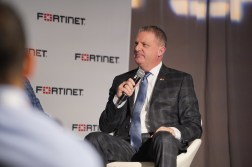Commerce CIO concerned with recruiting cyber workforce, funding modernization
The forthcoming transition is an uncertain time for many in federal government, including some in the IT space, but Commerce Department CIO Steve Cooper said Tuesday he thinks the career workforce will likely stay despite changes at the top.
What Cooper — one of several politically appointed CIOs who are all but guaranteed to resign Jan. 20 or sooner — is actually concerned about is the difficulties his department is having recruiting specialized workers, such as cybersecurity talent and project managers.
Cooper noted during a panel discussion Tuesday at a Bloomberg event that the career workforce is “pretty resilient” and said “most of them I think are going to stay the course.”
“I think they’re going to kind of obviously take a wait and see until the political leadership replaces the current political leadership,” he said. “And then kind of ‘all right let’s see what’s going on, let’s see which way is up. And then how much is my role, personally, kind of messed up?’”
He added: “If it’s really messed up, I still don’t think they would leave the government workforce. I think what they might do is they move somewhere else in the federal enterprise.”
Rather, it’s his department’s ability to recruit cyber talent that’s at the front of mind.
“[Office of Personnel Management] is doing some good things to assist with recruiting specialized talent, in this case cyber. We do have some ability to pay bonuses, hiring bonuses, retention bonuses,” he said. “We’re still having a very, very challenging time competing with the private sector.”
Cooper said he thinks ideas like a “CyberCorps” or exchanges with industry “will actually be how we bring new talent in.”
With a CyberCorps, government would pay for someone’s education in exchange for a few years of government service, he said.
In an interview with FedScoop, Rep. Will Hurd, R-Texas, said if he was reelected, he would tackle the “idea of a cyber National Guard,” which would provide a scholarship or repay the person’s loans in return for service in federal IT. Once those people return to the private sector after their service, Hurd said then, their companies would “loan” them back on a regular basis to deal with key issues.
[Read more: What if Congress loses Will Hurd?]
As Cooper nears the end of his tenure, he noted he also wasn’t able to initiate some of the projects the team wanted to do because of “a lack of skilled and experienced project and program managers.”
“We don’t have enough with all the right government and industry certifications,” he said. “There are rules that actually we have to have certain levels of expertise in order to put a project manager in charge of certain levels of projects and that type of thing.”
Another big concern for Cooper is just how exactly the federal CIO community will fund modernization.
He likened the lack of investment over time in the Washington Metro area public transportation system’s infrastructure to what federal government is experiencing broadly with its IT infrastructure.
“The federal CIO community, we’ve had a significant challenge in making a business case for large dollar capital investments,” Cooper said, noting that he thinks, “the days of that type of capital investment spikes, plural, across the cabinets and departments every three or four years, are over.”
That means figuring out a new way to fund modernization, Cooper said, advocating for enterprisewide services all agencies can leverage collectively, particularly infrastructure-as-a-service and platform-as-a-service.
After talking to federal CIO colleagues and others in leadership positions in government, Cooper suggested, “We could be given authority to share appropriated dollars where each of us might be able to put some money into the equivalent of this modernization fund that isn’t funded. Meaning, take some money out of our budgets, programming dollars, pool that funding and do things that really could be leveraged by every federal agency.”
Similarly, Hurd’s Modernizing Government Technology Act would authorize an unfunded centralized IT fund that agencies could draw from. The bill also authorizes working capital IT funds in each agency. It passed the House unanimously but has not yet seen much action in the Senate.
But Hurd told FedScoop in September “all the major pieces of this are supported by our friends on the Senate side.”
[Read more: Some agencies spending 90-percent of IT budget on legacy systems — report]
As a caveat Cooper said Tuesday he doesn’t think shared services should be administered by a federal agency — an opinion he said leaves him in the minority.
“Here’s why I’m absolutely not a fan of other federal agencies delivering shared services: I can’t hold them accountable. It’s that simple. I can’t fire them,” he said. “I grew up in the private sector before I came into the federal service. If somebody is not delivering what was agreed, how long are you going to stick with them? I’m not trying to be mean — how long are you going to stick with them? Well guess what: I can’t opt out. And until I have the ability to opt out, I think it’s a flawed model. It’s that simple.”
Cooper said he thinks the idea of large federal capital investments is dead in part because people have “lost confidence in the ability of… the federal enterprise, to deliver really big dollar, multi-year initiatives successfully. In this case success is very simple: on time, on budget.”
“We have a terrible track record,” he added.
That inconsistency gave rise to the ever more popular agile methodology, Cooper said, where agencies can break a bigger project up into small manageable chunks with more consistent deliverables.
Agile, he said, is “here to stay.”
“I think big, multi-year big dollar initiatives are gone, with the possible exception of the Decennial 2020 Census,” he said, but noting that “Census is actually using agile methodologies and iterative development.”
“I think we’re watching the beginning of a very real change in how initiatives and projects are delivered across the federal government,” he said.






